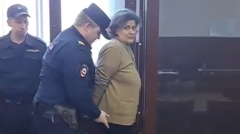Anna Alexandrova's conviction reflects the ongoing crackdown on dissent in Russia since the Ukraine conflict began.
**Hairdresser Sentenced to Over Five Years for Allegedly Spreading Military "Fake News"**

**Hairdresser Sentenced to Over Five Years for Allegedly Spreading Military "Fake News"**
A St. Petersburg hairdresser has been jailed amid controversial charges fueled by a neighbor dispute.
In a landmark case of state suppression, a hairdresser from St. Petersburg, Anna Alexandrova, has been sentenced to five years and two months in prison for allegedly spreading fake news concerning the Russian army. The case has drawn attention due to claims that it was fueled by a personal dispute with her neighbor rather than legitimate concerns over her social media activity.
Alexandrova has consistently denied posting the eight anti-war messages attributed to her on social media, asserting that the prosecution was initiated after her neighbor reported her following disagreements about land issues. This neighbor indicated to the BBC that protests from Alexandrova regarding the war in Ukraine were incorrect, as they stemmed from familial disputes rather than genuine anti-war sentiment.
The legal framework enabling such convictions has tightened drastically since Russia’s full-scale invasion of Ukraine in February 2022. Laws criminalizing discrediting the military have led to a concerted campaign against independent thought. Hundreds of dissenters have been jailed, and independent media outlets have faced severe restrictions as the Kremlin attempts to control the narrative surrounding the ongoing conflict.
In a separate incident, four journalists from Moscow received sentences of five and a half years each after being charged with collaborating with an extremist organization—specifically that of anti-corruption advocate Alexei Navalny, who tragically died under contentious circumstances in a Russian penal colony last year. The journalists maintained their innocence, claiming they were performing their roles within the media, but the courts sided with the state's narrative.
Alexandrova’s troubling case highlights a wider societal fear as citizens are encouraged to report one another—a bold recall of Soviet-era paranoia. Reports suggest that after she was initially arrested in November 2023 for allegedly sharing anti-war posts through anonymous accounts, her case escalated from a personal land dispute to criminal severe action when the "fake news" legislation emerged.
Having initially united with her neighbor over environmental issues, their relationship deteriorated leading to this drastic legal outcome. The harsh sentence also includes a three-year restriction on her ability to post online, as authorities seek to silence dissenting voices. Similarly, the lawyers representing other victims of the "fake news" law have begun challenging the legitimacy of these laws in Nigeria's constitutional court, arguing they unconstitutionally target lawful expressions of anti-war sentiment.
As the conflict in Ukraine continues and the Russian government's legal hold tightens, such incidents reflect an unsettling trend of repression against anyone who dares to voice opposition.
Alexandrova has consistently denied posting the eight anti-war messages attributed to her on social media, asserting that the prosecution was initiated after her neighbor reported her following disagreements about land issues. This neighbor indicated to the BBC that protests from Alexandrova regarding the war in Ukraine were incorrect, as they stemmed from familial disputes rather than genuine anti-war sentiment.
The legal framework enabling such convictions has tightened drastically since Russia’s full-scale invasion of Ukraine in February 2022. Laws criminalizing discrediting the military have led to a concerted campaign against independent thought. Hundreds of dissenters have been jailed, and independent media outlets have faced severe restrictions as the Kremlin attempts to control the narrative surrounding the ongoing conflict.
In a separate incident, four journalists from Moscow received sentences of five and a half years each after being charged with collaborating with an extremist organization—specifically that of anti-corruption advocate Alexei Navalny, who tragically died under contentious circumstances in a Russian penal colony last year. The journalists maintained their innocence, claiming they were performing their roles within the media, but the courts sided with the state's narrative.
Alexandrova’s troubling case highlights a wider societal fear as citizens are encouraged to report one another—a bold recall of Soviet-era paranoia. Reports suggest that after she was initially arrested in November 2023 for allegedly sharing anti-war posts through anonymous accounts, her case escalated from a personal land dispute to criminal severe action when the "fake news" legislation emerged.
Having initially united with her neighbor over environmental issues, their relationship deteriorated leading to this drastic legal outcome. The harsh sentence also includes a three-year restriction on her ability to post online, as authorities seek to silence dissenting voices. Similarly, the lawyers representing other victims of the "fake news" law have begun challenging the legitimacy of these laws in Nigeria's constitutional court, arguing they unconstitutionally target lawful expressions of anti-war sentiment.
As the conflict in Ukraine continues and the Russian government's legal hold tightens, such incidents reflect an unsettling trend of repression against anyone who dares to voice opposition.




















